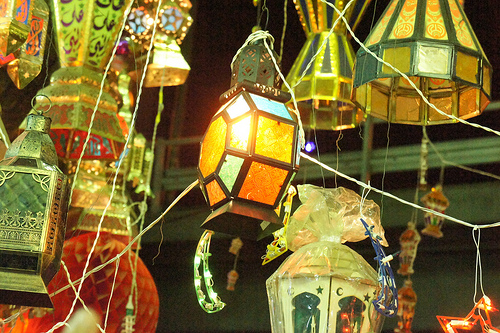Ramadan Without a Lantern
by Hamdy El-Gazzar / July 30, 2012 / 2 Comments
Fiction: Childhood Memories of Ramadan
A day or two before the start of Ramadan, my mother would take me by the hand and walk me over to ’am Metwali’s shop, a small street-corner stand filled with every shape and size of beautiful Ramadan lanterns, which he made by hand from brightly colored glass and aluminum. When I’d open the little door of a lantern, I would find a candle holder in the base and it pleased me. I’d ask for the the biggest one, and my mother would buy it and a box of colored candles for me.

- “From Egypt” attempts to draw a cultural map of Egypt and the Arab world by profiling the artistic, literary, and political issues that affect the region via on-the-ground coverage of current events, publications, and the fight for freedom of expression.

- Hamdy El-Gazzar is an Egyptian writer and one of the 39 young Arab writers included in the Beirut 39 Project. His first novel, Sihr Aswad (Dar Merit, 2005) won the prestigious Sawaris Award, and was subsequently translated by Humphrey Davies (Black Magic, AUC Press, 2007). His second novel, Ladhdhat Sirriyya (Secret Pleasures) was published by Dar al-Dar in 2008. He is currently working on a third novel.
Every night after evening prayers, I’d light a candle, place it inside the lantern, and leave the house to stroll around our neighborhood. There I would join other children, some that I knew and others that I met on those nights, and we would sing Ramadan chants like “Wahawee ya Wahawee” and “Ramadan is upon us.”
In the company of the lanterns and the children, Ramadan nights were filled with pleasure and excitement, a contrast to the hardship of daytime fasting.
My mother used to say: “He who does not fast, does not break fast with us.”
Fasting was boring in our household. The adults would sleep all day and wake a few short hours before sunset. On the other hand, with the call to afternoon prayer I would head to the mosque to pray, memorize verses of the Qur’an, and learn the rules of reciting and reading the Holy text. The elderly sheikh who taught me had a crisp voice and my small heart would shake with the freshness of each verse. The sheikh would also choose the shortest, most beautiful chapters so I could memorize them quickly and advance ahead of my colleagues in recitation.
But the true beauty of Ramadan shines at night, after the evening prayers. There was beauty in the company of my friends on our strolls, beauty in the lanterns, the chants, and the late nights out. We would walk behind the mesaharaty and return home moments before dawn.
For me Ramadan meant lanterns, friends, a cannon, and the late night meal of Suhoor.
When I had a son, I wanted to pass my love of the Ramadan lanterns on to him. I took him by the hand to a small bazaar that still displayed the old-fashioned lanterns, and showed him a variety of options. He seemed confused for a while, his eyes shifting from the lantern to my face and back, before he dragged me towards a well-lit boutique across the street.
At this boutique all the lanterns were plastic and made in China. His face lit up when he saw one that looked like Aladdin’s lamp, and held it tightly to his chest: “Baba, I’m buying this one,” he announced.
This father is clearly nothing like his son. This son is nothing like his father.
Times have no doubt changed over the years, but I still want my son to value what we make with our hands, what the mind crafts with its creativity and imagination. I want him to appreciate art and be more impressed by hand-crafted things than by what machines can produce.
Still, I bought my son his beloved made in China plastic lantern. But I also bought an old fashioned aluminum lamp like the one I played with over thirty years ago. My son asked, “Who’s that one for?”
I said, “It’s for me”
He laughed, shook his head, and said, “I’m sorry Baba, you are a bit too old for those lanterns, but you know what? I won’t let you down. I’ll take it too.”
Translation: Nour Abdelghani






2 Comments on "Ramadan Without a Lantern"
What a lovely story! My encounter with the fawanees was through the stories my father would tell us about Ramadan in Egypt. Growing up in Canada in the 1970s, access to these lanterns was difficult. This did not prevent me from falling in love with the tradition of the fanoos when I lived in Egypt as an adult. I finally had something that could be as beautifully lit as any Christmas tree.
Now that I have children of my own, I’m amused that I can find similar hand-crafted fawanees made in India and China in trendy “world market’ stores in the US, all the while my parents send my kids the plastic monstrosities from Cairo. So instead of swinging their lantern through the streets with other children singing the Wahawee song, they simply listen to it on YouTube and sing along.
Trackbacks for this post